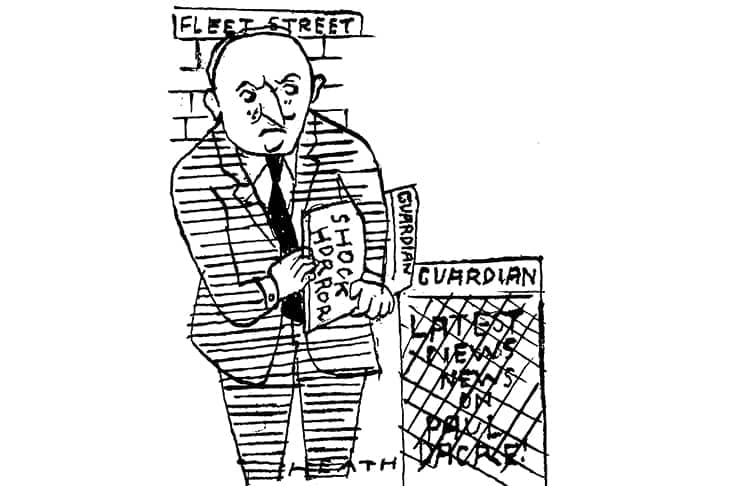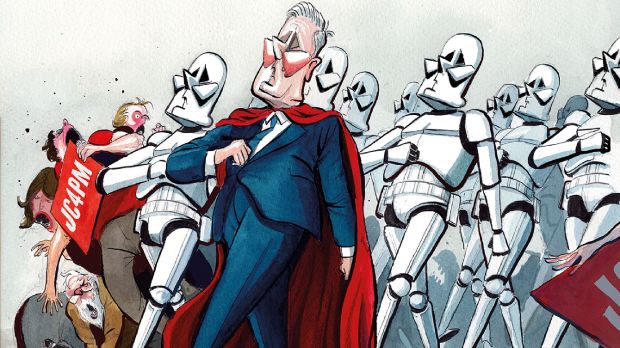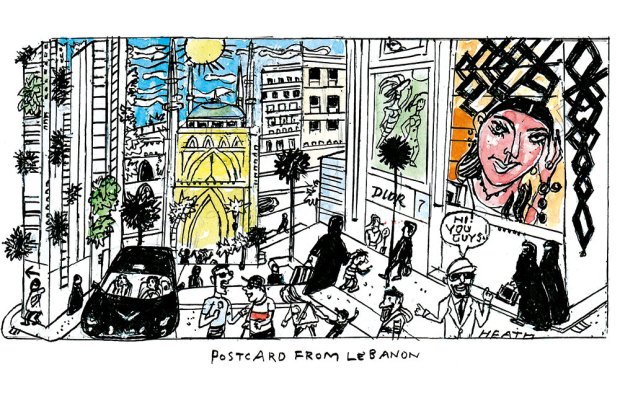‘You can appoint your own chief executive,’ boomed the PM over a rather sad bottle of wine. He was asking if I would like to chair the media regulator Ofcom because, he declared, he was determined to do something to end the usual suspects’ control of our public bodies. It was soon apparent that I couldn’t appoint my own chief executive. Or take people with me. And as all the key positions at Ofcom are chosen by ‘independent’ panels, the chairman’s role is heavily circumscribed.
So why bother? The answer was I was fascinated by the societal implications of the Online Safety Bill that Ofcom will implement. If I could help prevent paedophiles, hate preachers and terrorists exploiting the internet, protect young vulnerable minds from emotional manipulation, eradicate the malicious trolling of individuals (often from minorities) that is poisoning private and public discourse, eliminate fake news and preserve freedom of speech, well, that sounded a pretty good swansong to a magical career in journalism.
After all, in 28 years as an editor, I’d spent much time with ministers, judges and regulators trying to define the thin line between protecting the innocent and damaging freedom of speech. I’d also chaired the Editors’ Code of Practice Committee which — by balancing the rights of the individual and the public’s right to know — writes the rules for best journalistic practice that are emulated around the world. And I’d made a significant contribution to launching the world’s biggest English-language popular newspaper website. The problem is that the Bill is a dog’s dinner. There aren’t enough lawyers in the cosmos to define ‘legal but harmful’ content. How do you stop Facebook’s algorithms deleting legitimate news stories? But the real problem is the insidious anonymity behind which the web’s malfeasants skulk — an issue that, despite the civil-rights implications, is going to have to be addressed.
And Ofcom? Does it have the power and resources to resolve these philosophical conundrums and take on Silicon Valley’s leviathans of amorality? Worry not. Its chief executive, a brilliant career civil servant, latterly at the Ministry of Housing, has declared that her main priority is to revitalise the body’s diversity and inclusion strategy.
‘Vice is nice but incest is best,’ we chanted as children at playtime, sublimely ignorant of the words’ abhorrence. But, by Jove, Ofcom is partial to interfamily relationships, packing its ranks with former executives from the very BBC it’s meant to regulate. These include one board member who is tipped to be the BBC’s next director of news and another who headed the panel that adjudicates on complaints against the Corporation, and who had to resign because of his involvement in the Martin Bashir scandal. Oh yes, he also sat on Ofcom’s Nominations Committee. Thus does the BBC mark its own homework and the Blob promote its own.
While the mainstream quality press welcomed my candidature, the usual suspects (and, golly, the Guardian’s hysterical obsession with little old me is not just unhinged, it’s psychotic) were incandescent that one of their own was not being considered for Ofcom. Forget that the media editor of the Guardian, which used to be a fine liberal paper, is à deux with the BBC’s Brexit and Tory-hating news chief. The charge against me, was one of cronyism — defined by the dictionary as promotion of a friend. For the record, though I admire him for getting Brexit done, I am not a buddy of Boris’s. Indeed, the Mail I edited was harder on him than any other paper and on these very pages I opined that to say he had the morals of an alley cat was to slander the feline species. Nor do I recall the left complaining when New Labour packed public positions with their placemen, made a senior Blair policy adviser head of Ofcom, appointed its major donors Greg Dyke and Gavyn Davies as director-general and chairman of the BBC, and culled neutral civil service press officers to replace them with Alastair Campbell’s muckers. The truth is that recent Tory governments have utterly failed to exploit the dynamics of power and patronage so ruthlessly practised by Messrs Blair, Mandelson and Campbell.
The BBC, a magnificent British institution, needs saving from itself. By trying to appeal to every minority interest while competing in a race-to-the bottom ratings war, it spreads itself too thin. A bloated bureaucracy and an obsession with tick-box political correctness is diluting both its creativity and its relevance to millions of Britons outside the M25. Meanwhile, the on-demand streaming juggernauts are revolutionising the way we watch television, posing an existential threat to the BBC. And Ofcom, the body that advises the government on the future of the Corporation? It conducts laborious public consultations on what people want from the BBC, seemingly oblivious to the speed of this revolution. Fifteen years ago, few would have predicted that Britain’s regional and national press would be decimated by the internet. And yes, dear reader, naive twit that I am, I said all this to the interview panel which conceded that, though I performed well and had a strong grasp of technological issues, I possessed strong convictions that were incompatible with being an independent chairman.
A devastating lack of skills and experience in science, industry and manufacturing… treats business with hostility and suspicion… paranoid about the media… a culture of groupthink and risk aversion that stifles initiative and encourages foot-dragging.
No, those aren’t my words but a description of the civil service by the remarkable Kate Bingham, from the private sector, who so brilliantly led the Vaccine Taskforce. To which I would add that hegemonies such as the civil service and the BBC eventually end up believing they exist to look after the interests of their members and not the public they are meant to serve. Now we learn that the man from the ministry (whether he/she/they) seems more worried about (his/her/their) work-life balance than dealing with Afghan allies being murdered or flotillas of freezing refugees crossing the Channel. The divide between those who struggle to work to pay for the index-linked pensions of a dysfunctional civil service working from home and wallowing in wokery on its Peloton bike will, I predict, become one of the more contentious issues of our age. Come back, Dom — all is forgiven.
At dinner in the beautiful home of Britain’s best-connected peer, I sit next to Liz Truss. Is our Foreign Secretary the new Mrs T as those photos of her commanding one of our few remaining tanks would have us believe? She is clearly a toughie, possessed of a steely self-belief, an imperviousness to the media, a healthy contempt for the male species, a seemingly genuine belief in a low-tax, small-state economy and a disarming habit of asking abrupt questions and dismissing the response as ‘bollocks’ — a tactic clearly designed to gain further elucidation. I liked her and suspect she’s a comer. So I hope she won’t mind me suggesting that she might benefit from a Maggie-style makeover to smooth that metallic voice and irritating raucous laugh.
Why did ex-Guardian editor Alan Rusbridger’s wife write to the FT under her maiden name to denounce my Ofcom candidature? Could it be because her husband trousers a reported six-figure sum for adorning, as a fig leaf, the phoney and powerless Facebook Oversight Board — a move doubtless finessed by his old mate Nick Clegg, that other titan of rectitude, who is alleged to have lobbied civil servants to prevent my Ofcom bid. Now we learn the Oxford college of which Rusbridger was Principal accepted money from a trust set up by his fellow press hater, the late Max Mosley, whom a Mail investigation established was behind a by-election pamphlet which declared that ‘coloured immigrants’ threatened children’s health with VD and leprosy. Rusbridger (the founder of the Money Grows on Trees Society, whose most zealous members run the Todayprogramme) was vetoed as chairman of the Scott Trust by his own staff, who could no longer tolerate the awesome financial losses and redundancies resulting from his strategies. The ex-editor, incidentally, had his own strategy adviser, one Tony Danker. Could this be the same Danker who, as the new director general of the CBI, has just launched an extraordinary attack on Mrs Thatcher’s economic legacy? Indeed, it could.
And my chairmanship? Despite pleas from No. 10 and countless senior Tories, I decided that the toxic hatred of Brexit that is so palpable among the people who really run this country meant I would not be able to do justice to myself, or Ofcom or the public it’s meant to serve. I have decided instead to do a job I’m passionate about with a group of newspapers I love. Its staff, who work selflessly round the clock, are rewarded for initiative and shown the door for foot-dragging. And, yes, the Mail’s great campaigns, that really do make a difference, are anything but risk averse. La lutte continue…
Got something to add? Join the discussion and comment below.
Get 10 issues for just $10
Subscribe to The Spectator Australia today for the next 10 magazine issues, plus full online access, for just $10.
You might disagree with half of it, but you’ll enjoy reading all of it. Try your first month for free, then just $2 a week for the remainder of your first year.














Comments
Don't miss out
Join the conversation with other Spectator Australia readers. Subscribe to leave a comment.
SUBSCRIBEAlready a subscriber? Log in